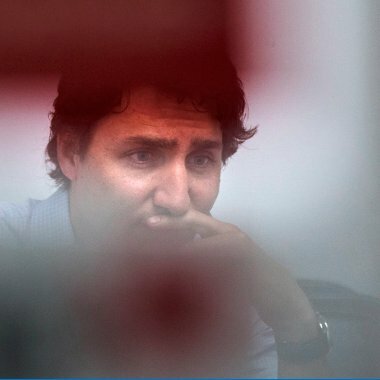
Justin Doubles Up
|
Watching the federal Liberals gear up for the election year, I can’t help thinking back to a speech Douglas Farrow, Professor of Christian Thought who holds the Kennedy Smith Chair in Catholic Studies at McGill University, gave last fall on their leader. |
 |
by Deborah Rankin
Watching the federal Liberals gear up for the election year, I can’t help thinking back to a speech Douglas Farrow, Professor of Christian Thought who holds the Kennedy Smith Chair in Catholic Studies at McGill University, gave last fall on their leader.
Provocatively entitled “Justin Trudeau and the Doctrine of Double Truth”, the lecture was part of a series on religion in the public sphere hosted by the Centre For Research On Religion at McGill.
Professor Farrow has written extensively on pluralism, religion, and public policy and is the author of a Desiring a Better Country, from which elements in this lecture were drawn. He also contributed an essay to Divorcing Marriage: Unveiling the Dangers in Canada's New Social Experiment, a volume of essays on the legal and cultural ramifications of same-sex marriage, co-edited with Daniel Cere.
Farrow drew a parallel between the concept of "double truth" in the middle ages and Justin Trudeau's present-day art of double talk on abortion and potentially other moral matters. Duplicity is nothing new for politicians Many have been known to speak out of both sides of their mouths whenever it is convenient.
However, a good many pundits would argue that Trudeau has taken this hypocrisy to new heights with his ban on pro-life candidates from seeking nominations to run for the Liberal Party of Canada in the coming federal election, even as he professes to respect the rights of MPs to hold views informed by their religious beliefs so long as they do not vote their conscience on them.
Farrow explained how a dispute arose between philosophers in the Faculty of Arts and religious thinkers in the Faculty of Theology at the University of Paris in the mid-1200s over Aristotle's ideas, some of which threatened belief in "universitas", the notion that there is a unity of truth and knowledge. Some philosophy professors of the time pursued a line of thinking contrary to Christian teaching; for example, espousing the view that there was a single-world soul while denying free will and divine providence. The upshot was that these teachings, along with a good many others, were condemned by the Bishop of Paris in 1277.
Fast-forward to 2022 and the controversy over Trudeau's pronouncements on abortion. It is no secret that the MP for the Montreal riding of Papineau has attributed his political views, as well as his religious beliefs, to his late father Pierre Elliott Trudeau - a formative influence in his life, as one might expect. However, Farrow highlighted marked differences in the approach of father and son on the issue of abortion, perhaps raising the question in the minds of his listeners as to whether Justin really understood his father's views on the matter, or simply exploited them for political advantage.
On the subject of Trudeau fils, Farrow reported on remarks Justin Trudeau made in an interview that have been widely quoted, "I had an extraordinary example in a father who had deeply, deeply held personal views that were informed by the fact that he went to church every Sunday, read the Bible regularly to us, and raised us (to be) very religious, very Catholic ... he held his personal views very, very strongly. But the understood that as leaders, as political figures, as representatives of a larger community, our utmost responsibility is to stand up for people's rights. ... The policy going forward is that every single Liberal MP will be expected to stand up for women's rights to choose. That doesn't impact or prevent someone from holding personal views - religious views - but it does mean that the Liberal Party protects women's rights."
Farrow asked his audience to compare this perspective to the one of Trudeau père.
“You know, at some point you are killing life in the fœtus in self-defence - of what? Of the mother's health or her happiness or of her social rights or her privilege as a human being? I think she should have to answer for it and explain. Now, whether it should be to three doctors or one doctor or to a priest or a bishop or to her mother-in-law is a question you might want to argue. You do have a right over your own body - it is your body. But the fœtus is not your body; it's someone else's body. And if you kill it, you'll have to explain."
While emphasizing a marked difference in tone - one of the father which acknowledges a moral dimension to the issue of abortion and the other of the son which treats it purely as a lifestyle decision of an individual without any ethical import - Farrow made it clear that there could be no compromise of moral truth.
"Now it will not do to mistake Trudeau père's view, as articulated here, for that of the Church. One does not explain that which is intrinsically evil; one rather repents of it. And where the evil in question is killing the innocent, civil law, like natural and divine law must forbid it; as indeed it did, until Trudeau steered C-150 through Parliament in 1969. But what are we to make of Trudeau fils' notion that something can be fundamentally wrong according to sound religion and yet fundamentally right according to sound politics? We can draw but one of two conclusions: either truth is indeed a house divided against itself, or else the realm of religion - of "deeply held personal views" - is not really the realm of truth or rationality at all."
Farrow said the current political context that Trudeau was creating with his ban on pro-life candidates was one where people of sincere religious convictions could not even consider entering political life, effectively marginalizing the discussion of religion in the public sphere.
He said he preferred the outlook of a more sensible man, Canadian media personality Rex Murphy, who didn’t subscribe to a “double truth” doctrine that privatizes religion so that it can have no real impact on public affairs. He said that Murphy had “put his finger” on the dilemma that the Trudeau edict on abortion has created for Liberal MPs in citing comments that Murphy made:
“What kind of politics are they which require an MP to renounce his deepest moral commitments; indeed, to go beyond renunciation and declare himself positively in favour of ideas and actions that his faith condemns, his Church forbids, and his conscience cannot abide?
Religion, under these conditions, cannot survive political engagement. An understanding of politics based on an exclusion of thoughtful and engaged religious people – on the rejection of ideas and understandings offered by the great religious teachers and the massive legacy of thought our churches have to offer – is radically incomplete. As things now are, a truly religious person must actually stay out of politics – must forgo an active role in democratic government – because in our brazen and new age, he or she will be required to betray their faith and themselves, and on those very issues that matter most: issues of life, family, autonomy, and the dignity of persons.”
Last Night at the Gayete

|
|
|
|
|
|
The Centaur Theatre's - season is drawing to a close with its final production of Last Night at the Gayety, a musical comedy by Bowser & Blue which runs until May 22nd. |
|
|


